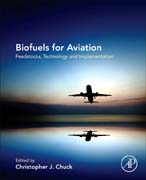
Biofuels for Aviation: Feedstocks, Technology and Implementation
Chuck, Christopher
Biofuels for Aviation: Feedstocks, Technology and Implementation presents the issues surrounding the research and use of biofuels for aviation, such as policy, markets, certification and performance requirements, life cycle assessment, and the economic and technical barriers to their full implementation. Readers involved in bioenergy and aviation sectors-research, planning, or policy making activities-will benefit from this thorough overview. The aviation industry's commitment to reducing GHG emissions along with increasing oil prices have sparked the need for renewable and affordable energy sources tailored to this sector's very specific needs. As jet engines cannot be readily electrified, turning to biofuels is the most viable option. However, aviation is a type of transportation for which traditional biofuels, such as bioethanol and biodiesel, do not fulfill key fuel requirements. Therefore, different solutions to this situation are being researched and tested around the globe, which makes navigating this scenario particularly challenging. This book guides readers through this intricate subject, bringing them up to speed with its current status and future prospects both from the academic and the industry point of view. Science and technology chapters delve into the technical aspects of the currently tested and the most promising technology in development, as well as their respective feedstocks and the use of additives as a way of adapting them to meet certain specifications. Conversion processes such as hydrotreatment, synthetic biology, pyrolysis, hydrothermal liquefaction and Fisher-Tropsch are explored and their results are assessed for current and future viability. Presents the current status of biofuels for the aviation sector, including technologies that are currently in use and the most promising future technologies, their production processes and viabilityExplains the requirements for certification and performance of aviation fuels and how that can be achieved by biofuelsExplores the economic and policy issues, as well as life cycle assessment, a comparative techno-economic analysis of promising technologies and a roadmap to the futureExplores conversion processes such as hydrotreatment, synthetic biology, pyrolysis, hydrothermal liquefaction and Fisher-Tropsch INDICE: 1. The role of biofuels in aviation 2. Feedstocks for a bio-aviation fuel 3. Certification and performance; what is needed from an aviation fuel 4. Alcohols and alternative oxygenated jet fuels 5. Fatty acid alkyl esters (biodiesel) for use in aviation 6. Lipid Hydrotreatment 7. Chemical upgrading of short chain oxygenates to aviation jet fuel 8. Synthetic Biology and metabolic engineering to convert carbohydrates to aviation range hydrocarbons 9. Pyrolysis of lignocellulosic biomass 10. Hydrothermal liquefaction of microalgae 11. Aviation fuels through the Fisher-Tropsch process 12. CO2 as a feedstock for aviation fuels 13. Additives for aviation to allow complex biofuels 14. Full scale engine testing and demonstration flights to date 15. Life cycle assessment 16. Government policy in delivering biofuels for the aviation sector 17. A comparative technoeconomic analysis of promising biofuels for aviation, including a roadmap to the future
- ISBN: 978-0-12-804568-8
- Editorial: Academic Press
- Encuadernacion: Rústica
- Páginas: 384
- Fecha Publicación: 24/06/2016
- Nº Volúmenes: 1
- Idioma: Inglés
